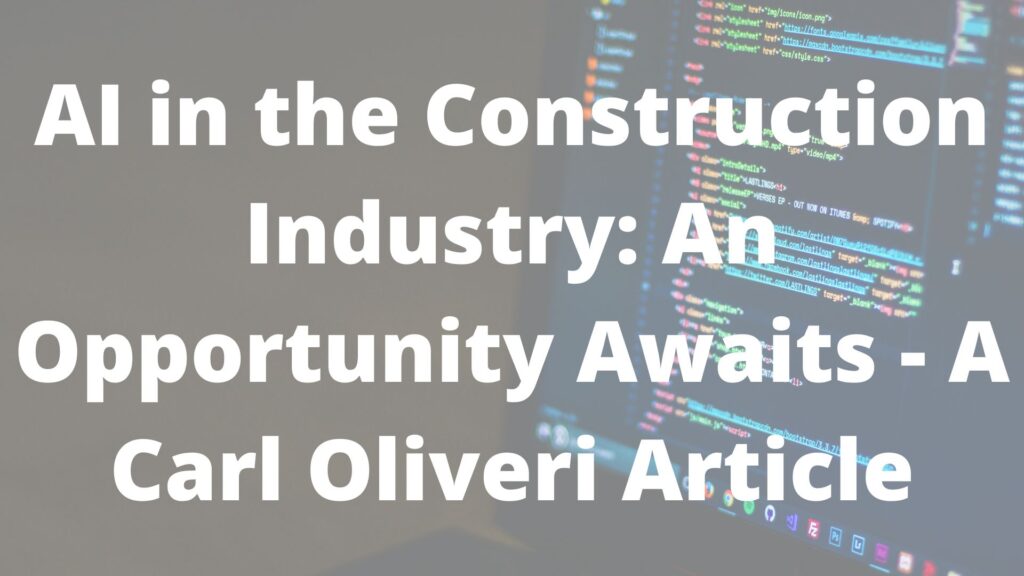
The Law Offices of John Caravella, P.C. does not own this content. This content was created by Carl Oliveri, and was published to the South Florida Business News. To view the full article, please click here.
The construction industry has typically been a late adopter of new technologies, as one executive put it to me: “Let everyone else figure out how it is supposed to work, and we can then adapt it into construction.”
Nothing is trendier right now than artificial intelligence (AI); it bleeds into every conversation. When the same executive was asked about his company’s AI plans, he estimated adoption of the tech to be 18 to 24 months away for the construction industry. However, for general contractors and subcontractors, it’s the second-ranked technology to invest in.
There is no question that contractors who don’t use AI will lose projects to those who do. The following are some business use cases the construction industry should consider as they implement AI.
- Cost reduction – The most obvious consideration when discussing rolling out an AI program across a construction company is how much it will cost and the return on investment. AI can give contractors more accurate cost estimating for jobs and companywide budgeting and forecasting.
- Design and planning – AI modules in the design process can efficiently create and optimize building designs. For example, building information modeling (BIM) has been used by the construction industry for years; now adding an AI component, we expect to see more accurate modeling and forecasting.
- Project management – AI can enhance project management by using predictive analytics to anticipate and mitigate potential issues by optimizing the construction schedule. AI will be able to analyze the data from past projects, current resources, and external factors (weather patterns, for example) to create more accurate and efficient project schedules. Project managers need to be in tune with these systems, as they can continuously adjust timelines as the project progresses, considering events in real-time.
- Resource allocation – There are only so many resources a construction company can deploy on a project. Using AI on a project will help the contractor optimize the distribution of labor, equipment, and materials across different phases of a project and/or across multiple projects. It can predict when and where resources will be needed, reducing downtime and improving overall efficiency.
- On-site automation – The skilled labor shortage has been well documented and discussed for years; AI can supplement by automating repetitive construction tasks, such as bricklaying, welding, and material handling. Further, while autonomous construction vehicles and equipment have been around for a few years, AI can enhance fleets with real-time decision-making.
- Safety – There has never been a greater emphasis on having safe job sites than now. AI can enhance the contractor’s protocols in a variety of ways. Wearable technologies are nothing new to the construction industry, but AI can improve how the contractor tracks laborer health and fatigue. Further, AI-powered monitoring systems will be able to detect hazards and prevent accidents on the job sites
- Quality control – Waste has always been an inevitable part of construction, from broken sheetrock to defective curtainwall components. While AI will not entirely eliminate waste from a project, there is an opportunity to drastically cut down on this as computer vision systems can be dispatched to inspect work quality and identify defects in real-time. A little further down the road, AI also presents an opportunity to monitor a project’s data to monitor structural integrity.
- Sustainability – Owners are looking to the construction industry for methodologies to build in a more energy-efficient, eco-friendly environment. AI can assist contractors in developing energy-efficient designs and ways to install materials. Another consideration is integrating AI into smart building systems to help monitor energy consumption and improve resource management.
AI is not just a tool; it’s presenting an opportunity for the construction industry to build better. It promises higher gross margins and increased profitability through fewer delays, more insights into costs and better project outcomes. This potential should inspire optimism and a proactive approach to AI adoption. But keep in mind, successful implementation and utilization of AI will require significant investment in terms of dollars and training, as well as a shift in management practices to leverage these new capabilities effectively.
For more information, please contact Carl Oliveri, partner and construction practice leader, or visit grassiadvisors.com/industries/construction.
Grassi is a leading provider of advisory, tax and accounting services for businesses and individuals. With offices in New York, New Jersey, Florida and Massachusetts, Grassi specializes in industry-specific solutions for key market sectors across the country, including construction, real estate, health care, manufacturing and distribution, nonprofit, financial services and more.
Carl Oliveri is the construction practice leader and a partner at Grassi. He has over 25 years of experience advising owners and executives in the construction industry, particularly in project-centric and companywide financial modeling, operational strategy development, financial statement accounting services and income tax method analysis.
 John Caravella Esq., is a construction attorney and formerly practicing project architect at The Law Office of John Caravella, P.C., representing architects, engineers, contractors, subcontractors, and owners in all phases of contract preparation, litigation, and arbitration across New York and Florida. He also serves as an arbitrator to the American Arbitration Association Construction Industry Panel. Mr. Caravella can be reached by email: [email protected] or (631) 608-1346.
John Caravella Esq., is a construction attorney and formerly practicing project architect at The Law Office of John Caravella, P.C., representing architects, engineers, contractors, subcontractors, and owners in all phases of contract preparation, litigation, and arbitration across New York and Florida. He also serves as an arbitrator to the American Arbitration Association Construction Industry Panel. Mr. Caravella can be reached by email: [email protected] or (631) 608-1346.
The information provided on this website does not, and is not intended to, constitute legal advice; instead, all information, content, and materials available on this site are for general informational purposes only. Readers of this website should contact their attorney to obtain advice with respect to any particular legal matter. No reader, user, or browser of this site should act or refrain from acting on the basis of information on this site without first seeking legal advice from counsel in the relevant jurisdiction. Only your individual attorney can provide assurances that the information contained herein – and your interpretation of it – is applicable or appropriate to your particular situation. Use of, and access to, this website or any of the links or resources contained within the site do not create an attorney-client relationship between the reader, user, or browser and website authors, contributors, contributing law firms, or committee members and their respective employers.
